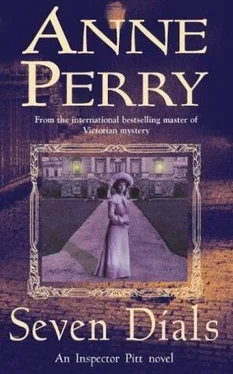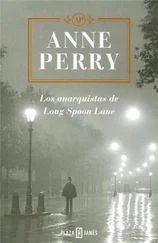“Yes,” Narraway said thoughtfully. “Yes… one result of it is that we should be able to exonerate Ryerson and Ayesha Zakhari completely… as long as we allow el Abd’s death to be taken as suicide.”
The tiny germ of an idea stunned Pitt’s mind, ugly and painful, and he refused to look at it.
“Is that what you are going to do?” Charlotte asked.
Pitt did not answer.
“It is all we can do, for the meantime,” Narraway replied.
They sat a little longer, warming themselves. Charlotte fetched tea. They spoke of the news for half an hour or so, even the very recent death of Lord Tennyson, and wondered who would be the next poet laureate, before Narraway rose and took his leave.
But as soon as he had gone, Pitt, restless and unhappy, also went out. He gave Charlotte no explanation because the fear inside him was too painful to give words to, even to her. It was as if, still unspoken, he could deny it a little longer.
He took an omnibus south to the Thames Embankment and the offices of the river police. There was only a sergeant on duty, but he told Pitt which morgue the hanged man had been taken to, and half an hour later Pitt was standing in the offensively clean tiled room with the familiar smell of carbolic and death filling his throat. He stared down at the swollen, purplish face of Tariq el Abd.
The mark of the rope was burned deep into his neck, crooked, high under one ear, and his head lay at an awkward angle.
Pitt touched the head to move it very slightly, searching for other marks, bruises, anything to indicate beyond doubt whether he had been struck before death.
He heard footsteps behind him and swung around more quickly than he had meant to, as if he felt himself in danger. His heart was knocking in his chest and it was difficult to draw breath into his lungs.
McDade looked at him with wry surprise.
“Jumpy, aren’t you, Pitt? What do you want to know? He died sometime during last night. Difficult to say when; the water affected the temperature of the body.”
“Tides?” Pitt asked.
“I did think of that.” McDade’s lips thinned fractionally. “I have been aware for some time that the water in the Thames goes up and down with monotonous and predictable regularity. However, what I cannot say is whether he was caught up in the wash of a passing boat that soaked him higher than the actual water level, or even if he slipped and got wetter than he intended.”
“Can you say for certain that he hanged himself?” Pitt asked. Even though it made no sense of anything they knew, he hoped intensely that McDade would tell him it was suicide.
McDade did not hesitate. “No, I can’t,” he said dryly. “He’s been knocked around a bit, bruised under the skin, but it happened either just before death or just after. There’s been no time for the blood to gather, no marks to see. Bit of a gash on his head under the hair, but that’s not necessarily a blow administered by someone else. It could have happened when he dropped, or any of a dozen ways afterwards-water carried him against the arches, struck by a passing boat, or even by driftwood or flotsam.” He shrugged his massive shoulders. “It could be murder, but I can’t tell you anything to prove it one way or the other. Sorry.”
Pitt pulled back the sheet and looked at the rest of the torso. There were other marks on it as if it had buffeted to and fro, and been caught by rough objects which had torn the skin in several places. He replaced the sheet and turned away.
“Will anyone see he gets a burial according to his faith?” he asked.
McDade’s eyebrows rose. “No one to claim the body?”
“Not so far as I know. I think the court will decide by now that he was the one who shot Lieutenant Lovat.”
McDade shook his head, his chins quivering. “You say that as if you are not sure it is true,” he observed.
“I’m sure it’s true,” Pitt replied. “I’m just not sure it is all of the truth. Thank you.” He closed the conversation and turned to go. McDade made him uncomfortable; he was too observant. And Pitt needed to speak once more to the river police about exactly where el Abd was found, the state of his clothes, and the precise hours of the tides last night. A time of death mattered to him; in fact, just at the moment the importance of it overrode everything else in his mind.
Two hours later, at a quarter to nine, he had the answers. He stood on the Embankment in the gusty wind, his coat flapping around his legs and his scarf whipping out sideways, staring at the racing water of the flood tide returning. Out on the river, boats churned the water, steamers, barges, a lone pleasure boat with only half a dozen people on deck.
Tariq el Abd had died between one and five in the morning. They could not be more accurate than that. It was a time when most people were at home in bed. Pitt could have proved he was there, because Charlotte always woke if he got up. A man who lived alone would have no such safety.
He realized how little he knew of Narraway’s private life; he had never even wondered about it. For that matter he knew almost nothing of Narraway’s past, his family or his beliefs either. He was private to the point of being secretive. The only thing Pitt was sure of was that Narraway cared passionately about his work, and the causes it served, and that there was a personal relationship between him and Ryerson which caused him deep pain and which he would not discuss, no matter what the circumstances. And it was that which ate at Pitt now with a hard, angry pain that he could no longer ignore. It must be now; there was just time before the court resumed-if Narraway was at home.
Pitt met him on the doorstep, dressed smartly in his usual perfectly tailored dark gray. Narraway stopped abruptly, his eyes wide, his face pale.
“What is it?” He caught his breath, his voice husky.
Pitt had never defied Narraway before, never even challenged him. He knew his own dependence upon Narraway too well, not only for his job in Special Branch, but for the guidance and the protection while he was feeling his way in learning a new skill. But the emotion inside him now had power to override all such careful considerations.
“Inside!” he said abruptly.
The wind was cold and there was a fine rain behind it. Narraway’s face hardened. “This had better be important, Pitt,” he said, now that his initial shock was controlled and the steel was back in his eyes.
“It is,” Pitt answered between his teeth. Perhaps he would have been wiser to say it all out there on the doorstep. He knew it, even as he followed Narraway in and heard the door close. Narraway led the way across the hall into his study and swung around.
“Well?” he demanded. “You have ten minutes. After that I am leaving whether you are finished or not. The trial resumes at ten. I mean to be there.” In the morning light through the large window, his face was ashen, the fine lines of strain and too little sleep marked harshly in the skin around his eyes and mouth.
“But the special new witness is dead,” Pitt replied. “There’ll be no revelations about Ayesha Zakhari’s motive now. El Abd’s suicide is almost as good as a confession.”
“Almost,” Narraway agreed tersely. “I still need to see the acquittal. What is it you want, Pitt?”
“Why do you suppose el Abd killed himself?” Pitt asked. He wished he were anywhere but here, doing anything but this. “He was on the brink of success.”
“We knew he was guilty,” Narraway said, but there was a fractional hesitation in his voice; perhaps no one but Pitt would have heard it.
Pitt stared at him. “And he was afraid? Suddenly? Afraid of what? That we would arrest him on the way into court and stop him from testifying?”
Читать дальше












